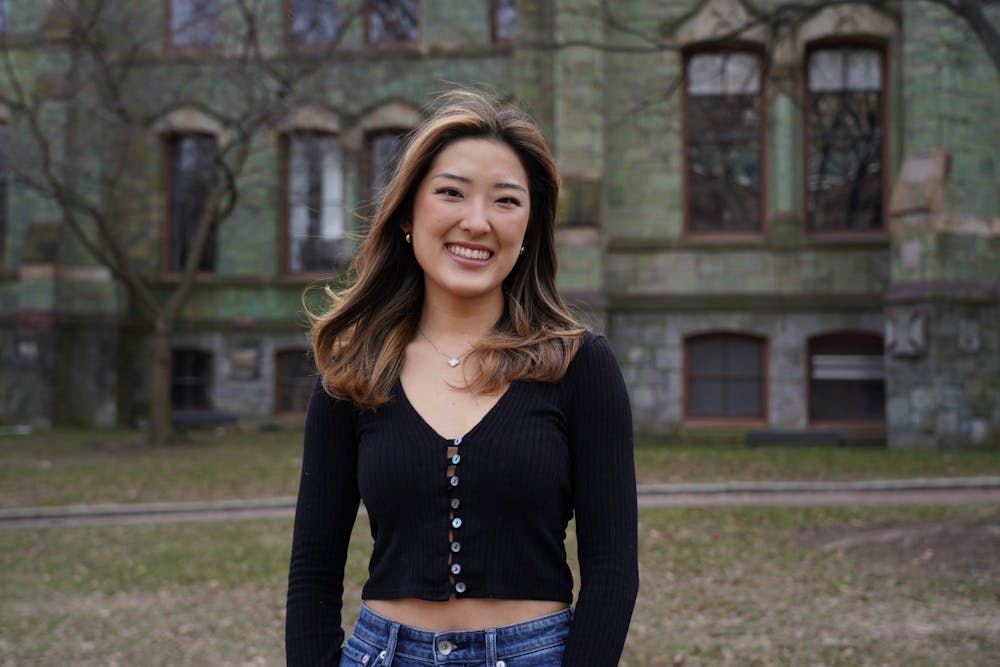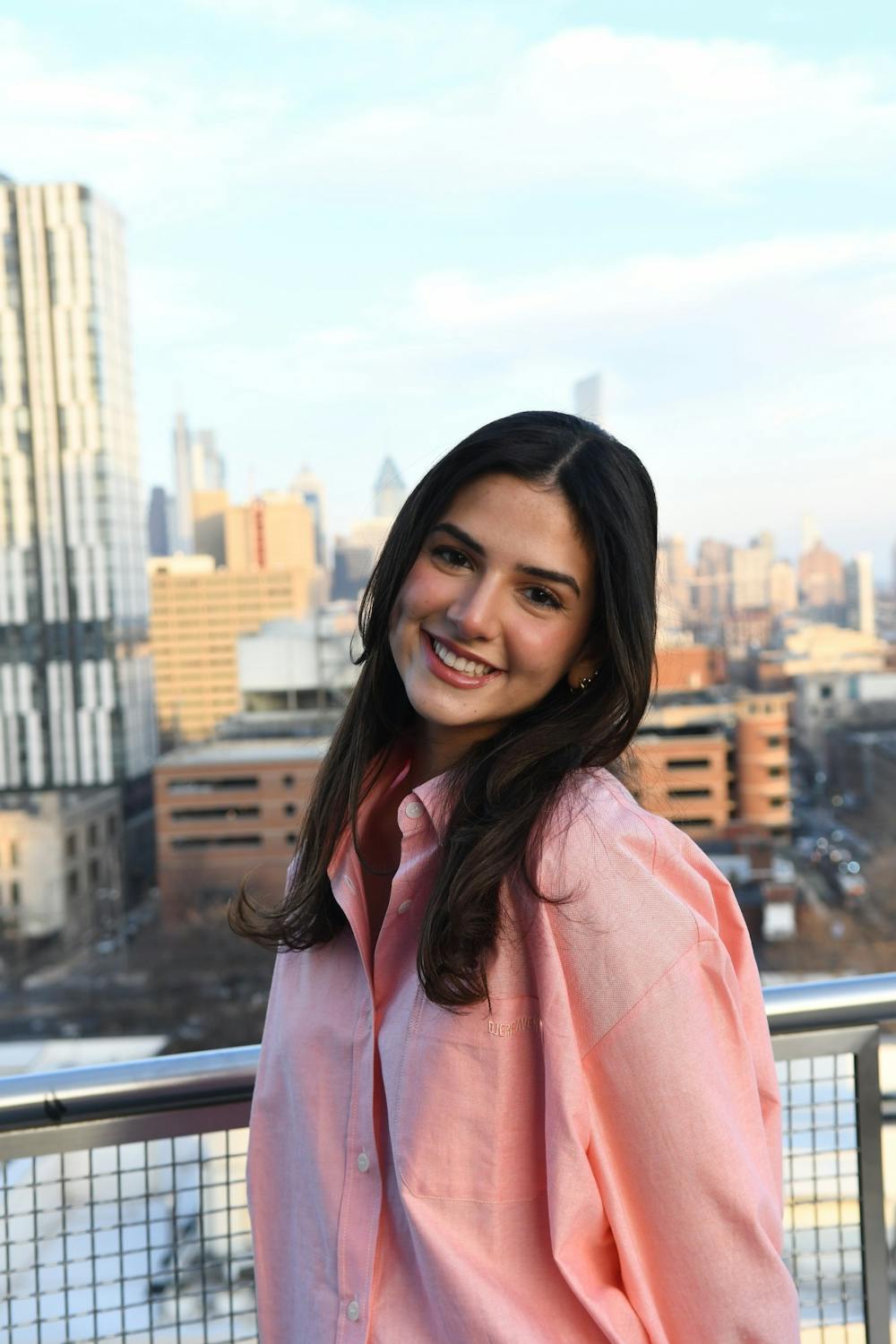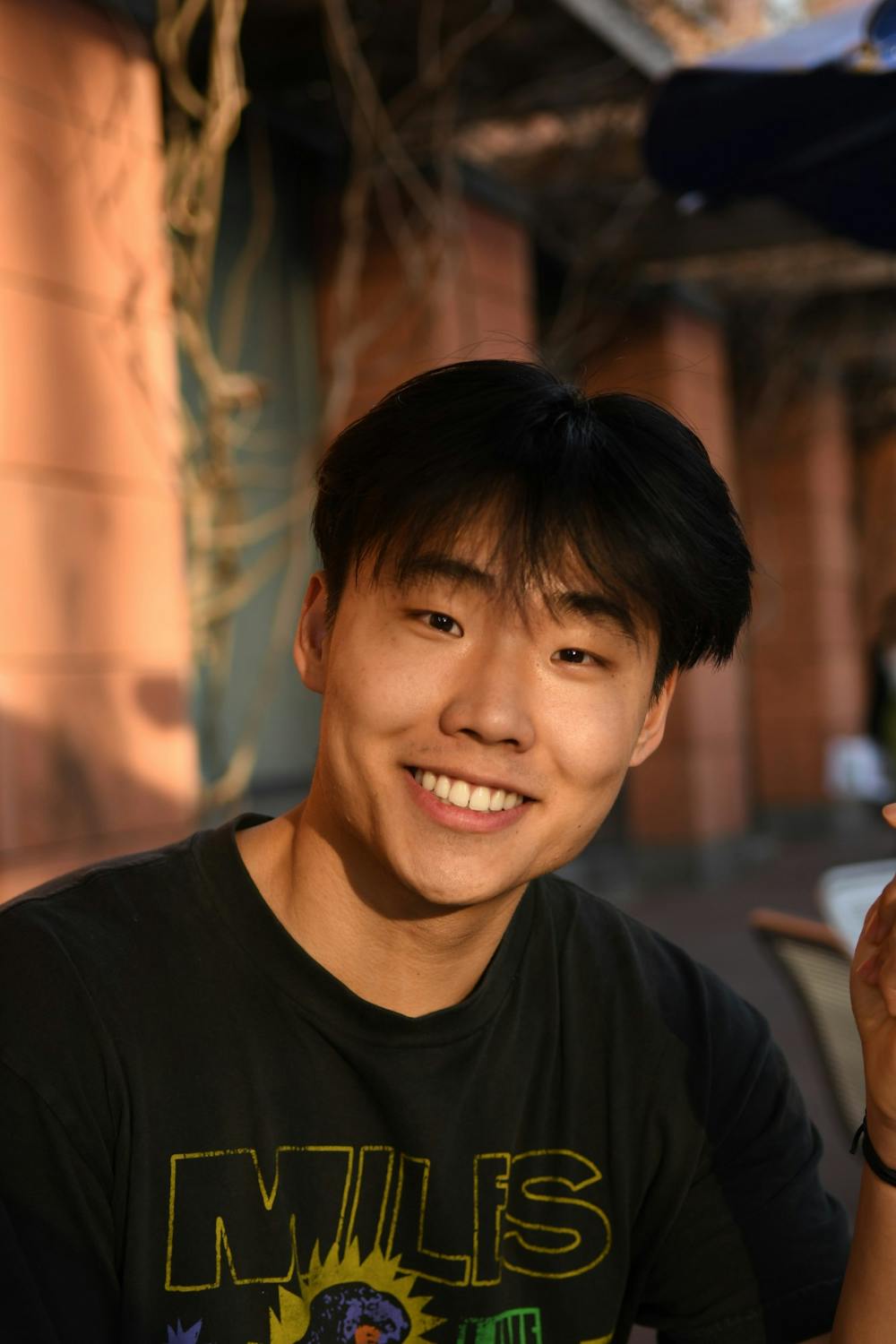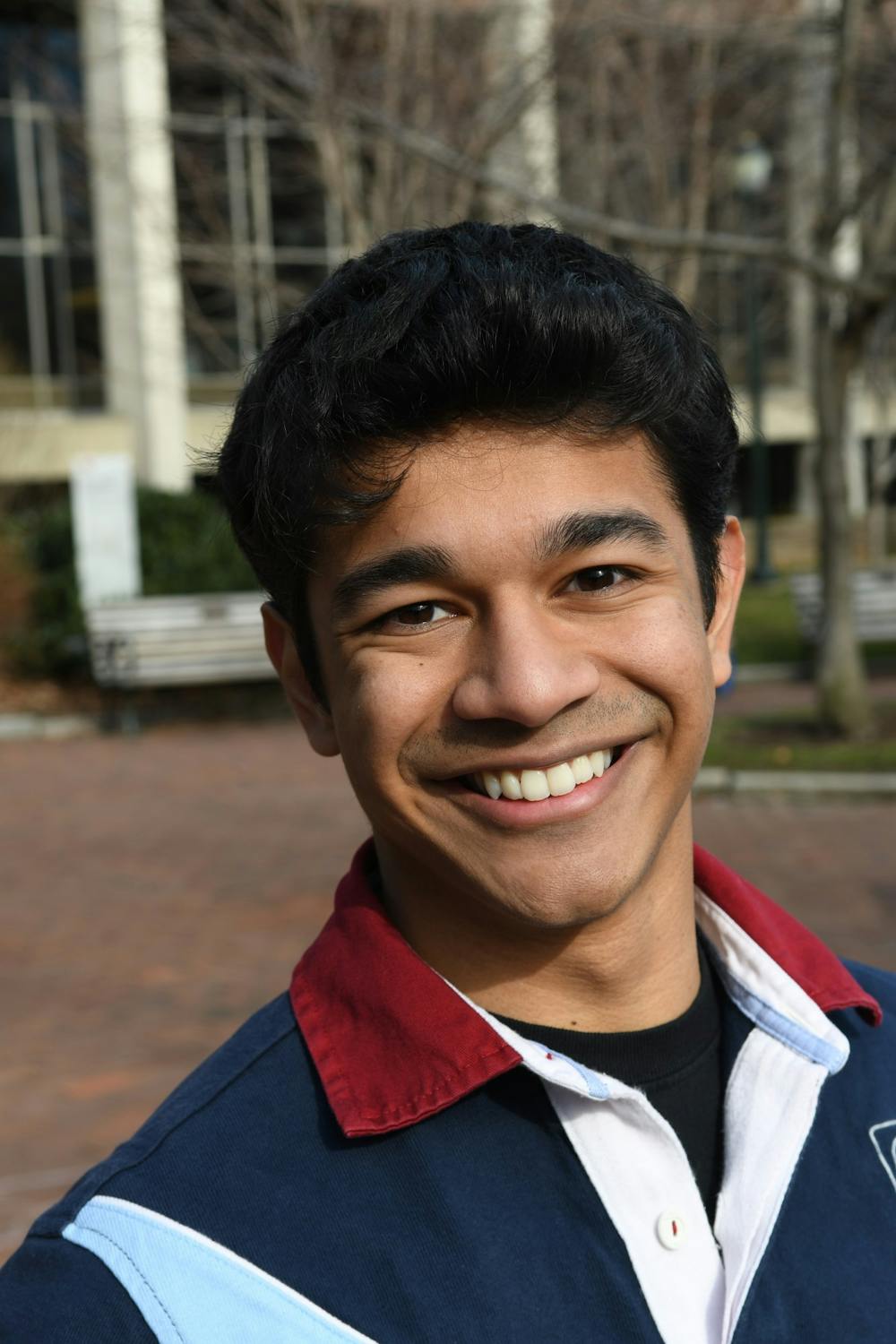For a generation that would rather get run over by a SEPTA bus than be forced to go dark on social media, it's no surprise that having any kind of online presence can naturally progress into a content creation hobby. Now, being an influencer is not only a hobby, but an occupation. Though creators seem to take all shapes and forms, student–influencers have thrived in their own corner of the internet for some time. In particular, student–influencers at Penn (Pennfluencers, if you will) have taken over our for–you pages, but what are the implications of curating a robust online presence?
At an institution like Penn that grooms its students to consciously nurture their professional brand, it’s curious that a digital footprint can be both an incredible asset and a student–influencer’s Achilles heel.
Most of us have been on the receiving end of the “digital footprint lecture” from our parents or teachers. But for those of you who haven’t, it’s pretty much every post, pic, tweet, and thread that makes up the entirety of your online persona. These cautionary warnings stick with us long after our formative years, reminding us to be wary of how #real we’re being online.
But content creators at Penn are flipping this narrative on its head and redefining what it means to be terminally online. Curating a social media platform and amassing followers seems to take on a new meaning for Penn students climbing the corporate ladder.
The typical college influencer’s origin story starts with the quintessential college decision reaction video. High school students love to document their experiences applying to college, some even compiling videos of themselves opening their decisions to share with the masses online. With screams of joy, tears of frustration, and sighs of relief, these videos—found largely on TikTok and YouTube—are primed for instant success. You’d be hard–pressed to find one with less than ten thousand views.
So what happens when the camera shutters close and the screen fades to black?
For Diana Lim (E ‘25), content creation came naturally after the success of her college decision video, which has now accumulated over half a million views. As with many other students, Diana’s video was a gateway into the world of content creation. Buoyed by her early success, she knew that she wanted to document her college experience once she arrived on Penn’s campus.

One viral video gave way to a dedicated viewership and now Diana posts monthly on YouTube to her 10,500 subscribers. Many students take the opportunity to offer a raw insight into college, revealing the ins and outs of campus life. At Penn, the student culture is half “Effective Altruism Retreat“ and half “Four–Day St. Patty’s Bender,” and student influencers aren’t afraid to show both sides of it.
For some students, the prospect of capturing their college experience on film seems horrifying. Nevertheless, it’s captivating and fascinating to watch a Penn student’s life unfold on a screen and online. While the attention is certainly a plus, Diana explains that she wants to “democratize information for incoming college students.” The idea of the college experience can be ambiguous, but considerations like housing and the Penn dining plan don’t have to be so uncertain. In sharing her own experiences and advice, Diana hopes that her channel reaches people in a tangible way.
Diana’s videos have certainly reached a wider audience than just her peers at Penn. Since growing her channel, she’s partnered with a range of sponsors from beauty brands to college counseling companies. During her summer internship at SoFi, she even shared short day–in–the–life videos. ”I remember talking with the [internship] recruiter and I mentioned that I had a YouTube channel,” says Diana. “He said that stood out about me because he saw it as a hustle and had a lot of respect for that.”

Roene Nasr (C ‘24) is another content creator at Penn and Diana’s big in Alpha Phi. Though the influencer community is small and spread out, some students have connected over their content creation. Roene’s TikTok journey follows a path familiar to most children of the COVID–19 TikTok baby boom. She established her platform with lifestyle content during the early months of the pandemic and now, roughly three years later, social media has become a fixture in her life.
With a following of 17.5k on TikTok, it’s understandable why Roene is fearful of being vulnerable on the internet. She acknowledges the concrete ways that Penn student–influencers curate their online presence by sharing busy days filled with club meetings and classes while omitting more intimate and raw moments. “I'm guilty of picking a day when I have a lot of things going on. I'm not going to choose a day [to vlog] when I sleep until noon and just barely do any work,” she says.
Like Diana, Roene has lofty ambitions—she’s a neuroscience major on the pre–dental track. Despite the demanding coursework, she’s found a way to marry her academic interests with her content creation. She recalls a particularly proud moment in which Penn Medicine reached out to collaborate with her to promote the opening of their new building, the Pavilion.
Roene explains that a brand deal typically pays more than an internship or scholarship opportunity; there’s an ever–present temptation for influencers to re–route their career plans in favor of living their lives online, full–time. Aside from the sense of personal accomplishment that comes from forming brand partnerships, the compensation certainly sweetens the deal.
Although Roene is set on her academic career, the (ostensibly) easy money associated with the full–time influencer lifestyle is certainly alluring. “It's crazy to see the opportunities that content creation brings and it's definitely helpful with the student debt that comes with undergrad and dental school,” she says.
Of course, not every Pennfluencer makes their elite Ivy League institution into their online brand.

Andy Jiang (W ‘25) has amassed an impressive 3.6 million followers on TikTok and 1.35 million subscribers on YouTube, with over a billion views. With a simple bet from a friend—$20 for 1000 followers in a week—and global pandemic afoot, Andy dove into TikTok headfirst.
Ironically, he was the most chronically offline of his friend group. “I don't think I've ever put any stories, posts on Instagram, [or used] any sort of social media,” Andy says, “so [that] was also the reason he directed the bet towards me.” In spite of that, Andy managed to win the bet—and then some.
“Very early on I channeled my social media presence online into something positive for people to look forward to during COVID quarantine because spirits were very low,” Andy adds. He started a series called the Daily Dose of Good News, which gathered all the certifiably life–affirming news he could find and compiled it into a 32–second video every single day.
Now with over a billion views and nearly five million followers across his platforms, Andy has never considered deviating from his signature brand of feel–good storytelling. Despite his seemingly overnight success, he wasn’t deterred from the traditional college experience either—Andy has bigger upcoming plans in store. With the platform he’s building, he hopes to eventually start his own media company.
In the future, Andy wants to scale up his platform. Currently, he’s responsible for sourcing, writing, and recording his storytelling content. Eventually, he hopes to globalize his platform by outsourcing the majority of this work to people on the ground searching for the most captivating stories to tell. “I'm thinking about this hierarchy where a lot of different people are on the ground [in] various countries, various unique places.” Then he would take it upon himself to travel to meet these real people and tell their stories first–hand. This multi–tiered scheme would allow for content to be produced faster while “maintaining quality and the actual original goal and brand,” according to Andy. Whether it's delusions of grandeur or genuine grit, it doesn’t seem like anything will be getting in Andy’s way.
For most student content creators, even those with Andy’s following, the brunt of the behind–the–scenes work is done alone. Andy does all of the basic research, script writing, filming, and basic cuts for edits. Only then does he pass along the product to be polished by another editor.
Andy’s roommate and fellow content creator Yash Mahajan (C ‘25)—together, they call themselves the “UPenn Hype House”—bemuses that he often hears Andy recording content late at night through their paper–thin shared wall. This conundrum was a point of contention for the duo earlier in the year. Yash recalls saying, “Andy, I want to sleep before 2 a.m. I can't [when I] hear you saying ‘Did you know?’”

Although many student–influencers have found their influencer status to be both a creative outlet and a lucrative side hustle, that’s not true across the board. Yash originally made a TikTok on Ivy Day, recording his reactions to college decisions, and like most others, it went viral. Now he has a following of over 15k and uses his platform to create humorous, relatable content while sharing his Penn experience. However, as an international student from Singapore, he faces monetization obstacles, ultimately preventing him from profiting from any of his content.
“There's a TikTok Creator Fund, but I don't qualify for it because I'm not an American citizen, so I’m not getting any money for any of my videos,” Yash says. He laments receiving exciting offers for paid Brand Ambassador deals that he can’t legally accept. Handshake reached out to him to be a panelist and create content for their new international student recruiting program, but the contract required a special international visa.
“I really wanted to do [the deal], so I sent it to the international student support office at Penn and I was told that if I accepted the contract I wouldn’t be able to sign on for an internship in the U.S. next summer,” says Yash.
Despite facing monetization challenges, Yash believes that social media is a powerful tool, and both the soft and technical skills he’s gained as a result will continue to parlay into his future career endeavors. He concedes that “through a pre–professional lens, content creation gives you a step forward because you understand modern marketing tools and you understand social media on a different level because you are someone who's trying to create your own content too.”
In a sea of serious, well–accomplished Penn faces, it’s refreshing to see students document their college experience candidly. Some argue that to be an influencer is to perpetually curate your online presence, and indeed, the content creation process lends itself to editing a more exciting, digestible, and in some cases, viral version of yourself. But students like Diana, Roene, Andy, and Yash have found space to create content that doesn’t erase the person behind the camera.
Content creators themselves aren’t the only ones realizing and harnessing the power of social media. At Penn, the Signal Society has built a publication and community that encourages “the exploration of unconventional career paths and creative passions at Penn.” Now a budding collective of “creators, designers, writers, and everything in between,” the Signal Society has become a home for those who seek alternative creative outlets. With his robust platform on TikTok and YouTube, Andy also found a community in Signal Society.
Past Co–Director of Signal Society, Jerry Gao (E ‘23) explains that they use social media and content creation to shape a new, raw narrative of the Penn experience, even including failure in college and beyond. They have spun off of Jubilee’s popular series “Where We Stand” to highlight the myriad of experiences and perspectives of Penn students across all four colleges.
In another digital project, the Signal Society tackles “Penn face” through the “Anti–Resume Project.” Their aim is to foster dialogue around failure and overcoming challenges within your personal and professional career. “You think of a resume and you think of successes and highlights, but the anti–resume asks seniors, alumni, and faculty to fill in the resume with the ‘failures’ they’ve had during their academic and professional careers,” explains Jerry.
Penn’s pre–professional environment perpetuates an overwhelming pressure to both define your ten–year plan and ensure that it comes to fruition. In the midst of the scramble for success, student–influencers are finding new mediums and platforms to take charge of their own narratives, all while documenting their lives along the way.
These TikTok and YouTube videos have generated a wave of content created by, and for, Penn students. Sure, it’s up for debate whether or not a “Big–Little Weekend” vlog or a TikTok about Penn’s nightmare course selection period are really groundbreaking content. But all debates aside, we continue to consume these videos with a voracious appetite. So continue to like, subscribe, and comment—because who else is going to capture the Penn experience as earnestly as your local Whartonite or APhi sister?
